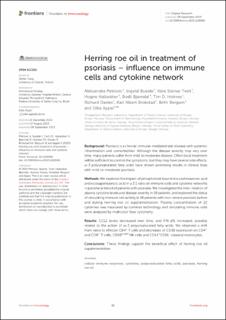Herring roe oil in treatment of psoriasis – influence on immune cells and cytokine network
Petrovic, Aleksandra; Bueide, Ingvild Øye; Tveit, Kåre Steinar; Hallaråker, Hogne; Bjørndal, Bodil; Holmes, Timothy Dunstan; Davies, Richard Allan; Brokstad, Karl Albert; Bergum, Brith; Appel, Silke
Journal article, Peer reviewed
Published version

Åpne
Permanent lenke
https://hdl.handle.net/11250/3112187Utgivelsesdato
2023Metadata
Vis full innførselSamlinger
- Department of Clinical Science [2318]
- Registrations from Cristin [9791]
Sammendrag
Background: Psoriasis is a chronic immune-mediated skin disease with systemic inflammation and comorbidities. Although the disease severity may vary over time, many patients suffer from mild to moderate disease. Often local treatment will be sufficient to control the symptoms, but they may have several side effects. ω-3 polyunsaturated fatty acids have shown promising results in clinical trials with mild-to-moderate psoriasis.
Methods: We explored the impact of phospholipid bound docosahexaenoic acid and eicosapentaenoic acid in a 3:1 ratio on immune cells and cytokine networks in peripheral blood of patients with psoriasis. We investigated the inter-relation of plasma cytokine levels and disease severity in 58 patients, and explored the status of circulating immune cell activity in 18 patients with non-severe psoriasis before and during herring roe oil supplementation. Plasma concentration of 22 cytokines was measured by Luminex technology and circulating immune cells were analyzed by multicolor flow cytometry.
Results: CCL2 levels decreased over time, and IFN-γR1 increased, possibly related to the action of ω-3 polyunsaturated fatty acids. We observed a shift from naïve to effector CD4+ T cells and decreases of CD38 expression on CD4+ and CD8+ T cells, CD56bright NK cells and CD14+CD16- classical monocytes.
Conclusions: These findings support the beneficial effect of herring roe oil supplementation.
